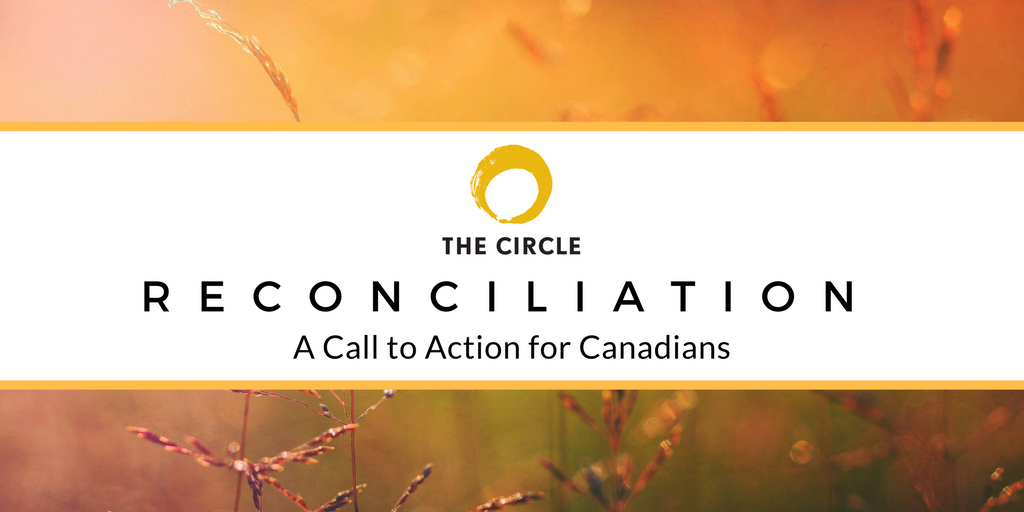This post is part of our co-presented blog series with The Circle, Reconciliation: A Call to Action for Canadians, and is provided by Shereen Munshi, Communications Coordinator at The Circle on Philanthropy and Aboriginal Peoples in Canada. This multi-part blog series features stories and charities working with Indigenous Peoples on a variety topics and issues affecting Indigenous Peoples in today’s Canada.
Canadians from coast, to coast, to coast have heard rumble of the movement towards reconciliation with Indigenous Peoples. In this introduction to our new blog series, co-presented by The Circle on Philanthropy and Aboriginal Peoples in Canada (The Circle) and CanadaHelps, we take a closer look at the commitment, momentum, and urgency of reconciliation. You’re invited to use this as an opportunity to learn, understand, and participate in reconciliation by considering how you will contribute your footprint in this collective path.

Walking The Walk
Reconciliation is a journey that engages three principal elements of day-to-day life: personal, community and professional. With 82 percent of Canadians feeling that they have a role to play in the reconciliation process (The Environics Institute),—and at this particular moment after six generations that reconciliation is possible—it is essential that Canadians work alongside Indigenous peoples.
Reconciliation begins with the individual. It involves a personal willingness to be uncomfortable as you unearth the hidden truths of our shared history and come to terms with the states of emergency facing Indigenous communities today.
As you seek out ways to learn about reconciliation, your personal journey will grow to involve your community. Does your city have a Walk for Reconciliation? Where is your nearest friendship centre? What upcoming reconciliation-focused programs are happening this year? By participating in reconciliation with your community, you will begin to build relationships and a circle of Indigenous and non-Indigenous friends.
Once you have engaged in the necessary dialogue, you will have the foundation and peer groups you need to begin working towards reconciliation in a professional space. Start by reading The Truth and Reconciliation Commission (TRC) and engage with co-workers on serious self-reflection about your organization’s role in reconciliation. Which of the TRC’s 94 Calls to Action relate to your organization’s work? How will you implement them? Rethink the way you are doing business and find ways to build relationships of trust, respect, and opportunity.
Indigenous people have the vision, answers, and capacity to prosper in fruitful communities. As Canada’s donor community it is our responsibility to lend our support through donations, volunteerism, and working alongside Indigenous peoples to cultivate positive change. Indigenous charities are implementing a wide range of innovative approaches that go from empowering youth, inspiring through education, and combating violence against women and children.
By donating to an Indigenous charity, you help build the financial capacity to cultivate positive change, but what makes a “charity” Indigenous? We invite you to use the Definitional Matrix below as a tool to navigate donating to: Indigenous “charities”, Indigenous-focused “charities” and “charities” that have Indigenous beneficiaries.

Series Sneak Peek
Over the course of the next week, CanadaHelps and The Circle will be sharing different stories from people working in reconciliation on Indigenous-focused initiatives. Tweet your reflections, questions, and pledges to @TheCircleCanada and @CanadaHelps, using the hashtag #ReconciliationInAction.
150 Acts of Reconciliation
As Canada celebrates 150 years of confederation this year, it’s more important than ever for Canadians to take part in reconciliation with Indigenous Peoples. Active History suggests 150 tangible ways any Canadian can incorporate simple acts of reconciliation in their daily lives.
Indigenous Peoples Are Fighting For Us All
On the front lines working to preserve and protect Canada’s natural environment, Indigenous Peoples are fighting for us all as they lead efforts to prevent environmental destruction. David Suzuki, co-founder of the David Suzuki Foundation, explains how that fight has continued on until today.
Reconciliation in the Downtown Core
With Indigenous Peoples being one of the fastest growing demographics in urban areas, the Anishnawbe Health Foundation is using traditional medicines in an effort to heal the long-term effects of Canadian assimilation policies.
Indigenous Youth — the Key to Canada’s Future
With over 18,000 Indigenous students denied government funding for their education between 2006 and 2011, access to education isn’t as easy as showing up to class. Helping students soar to new heights, Indspire is making sure Indigenous students are not left behind.
Leave a Reply